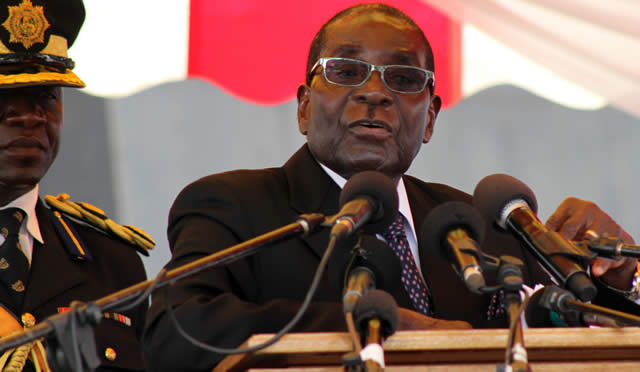Chiadzwa: Too many questions, too few answers


Precious gems were extracted, companies and individuals made money and Zimbabwe learnt its lessons on how not to run a diamond industry
Lloyd Gumbo Mr Speaker Sir
Only a few companies were visible through their corporate social responsibility activities while the majority appeared non-existent yet they were on the ground mining diamonds.
On Monday last week, Zimbabwe officially parted ways with four of the five companies that were mining diamonds in Chiadzwa, after the companies failed to comply with the law by not renewing their mining licences.The four are Mbada Diamonds, Anjin Investments, Diamond Mining Corporation and Jinan, where Government or its agents had 50 percent shareholding, while Marange Resources which is wholly-owned by Government has a running permit.
It is a given that the majority of Zimbabweans have nothing to show for all the noise that was made after the discovery of the precious gems in Chiadzwa. After the discovery of the gems and the subsequent restoration of order after banishing of illegal panners and licensing of about eight companies, Zimbabweans thought finally the country would bust the Western-imposed sanctions.
It is clear that the licensing of all those companies at the same time could have been done in order to expedite extraction of the precious gems which was in turn expected to enhance revenue inflows into Treasury. But alas, almost 10 years after conventional mining began, the country is still counting its losses. Precious gems were extracted, companies and individuals made money and Zimbabwe learnt its lessons on how not to run a diamond industry.
Mr Speaker Sir,
Only a few companies were visible through their corporate social responsibility activities while the majority appeared non-existent yet they were on the ground mining diamonds. For a long time, various stakeholders raised concern about the composition and performance of the many diamond mining companies that were licensed to extract precious gems in Chiadzwa.
Issues were raised about alleged corrupt allocation of mining contracts, secret sales of diamonds and failure to declare dividends, despite the fact that proper mining was going on. In short, the right noises were made about the alleged underhand dealings in Chiadzwa, but up to now some people are still walking scot-free and still occupying strategic positions in society.
What is clear is that there are more questions than answers as to what happened at Chiadzwa.
Mr Speaker Sir,
How does one explain the fact that one investor got into joint ventures with Zimbabwe in two firms giving the same investor 50 percent shareholding in each of them?
How does one explain that the country got less than $2 billion for the past 10 years, yet millions of carats were extracted? How does one explain the fact that some companies have outstanding statutory payments, yet they have been selling the diamonds? More so, why were the other companies’ production levels and the quality of the gems deteriorating while Marange Resources, a wholly Government-owned improved the quality of its gems? How did the ousted companies fail to invest adequately in machinery that would have seen them mine kimberlites, or at least industrial diamonds?
Where did they put the money that they realised from the sale of alluvial diamonds they have been mining? Zimbabweans were made to believe that fellow citizens had been put into strategic positions to protect and defend the country’s interests, but why is it now we are told the country could have lost out in their watch or through collusion?
Why is it that nothing was done to oblige the companies to contribute to community development, where they were mining when they claimed that they were not aware of the existence of the Zimunya-Marange Community Share Ownership Trust that was launched by President Mugabe in 2012? Is it not that some people in Government were telling them to disregard it for something in return, particularly for them as individuals?
Mr Speaker Sir,
All these questions beg for answers that some people have to answer. If truth be told without fear or favour, Government must shoulder all the blame, because the red flag was raised on several occasions, but no one took note before it was too late. It had to take the audacity of the current Mines Minister Walter Chidhakwa to propose establishment of a consolidated firm, as a way of improving transparency and accountability.
Gladly, statutory obligations were introduced as a way of ensuring that diamond firms contribute something to the exchequer on a monthly basis.
But every development comes with its lessons.
The majority of things that are emerging now are not in any way new, but have always been in the public domain though Government was reluctant to acknowledge it.
For instance, now it is clear that politicking on issues to do with national resources must be relegated to the dustbin, because the opaqueness that characterised the diamond industry was pointed out as a recipe for disaster by different authorities when conventional mining started.
Obviously these companies took advantage of the open cheque from Government to engage in illicit sales and pocketing proceeds, while nothing in the form of dividends was declared to Treasury.
Mr Speaker Sir,
How on earth does a diamond company fail to record profits when it’s mining and auctioning the precious gems?
The major problem is that Government, or at least its agencies were demanding money from some of these firms for payments of some services without following laid down procedures.
This gave some companies a false impression that Government or its ministries did not want things done transparently, hence the shenanigans.
It is therefore important that Government takes this as a lesson that every cent that is meant to benefit the country must go through Treasury for easy checks and balances.
Government must ensure that whatever transactions, whether donations, or loans from local companies are done in a transparent manner to avoid sending a wrong message.
It is also important to ensure that whoever is appointed to strategic positions, their integrity and dignity must be unquestionable.







Comments